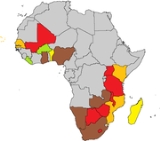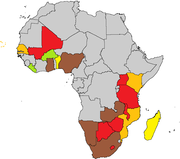
Afrobarometer
Encyclopedia
The Afrobarometer is a research project that measures
public attitudes
on economic, political, and social matters in sub-Saharan Africa
.
It is carried out through a partnership of the Institute for Democracy in South Africa (IDASA) , the Ghana Center for Democratic Development (CDD), and the Department of Political Science at Michigan State University
.
Afrobarometer results are based on face-to-face and house-to-house interviews of individuals and are considered reliable
and generalizable.
As of October 19, 2006, Afrobarometer data and publications had been cited 216 times.
 As of January 2011, the project had conducted four main rounds of surveys, covering a total of 20 African countries, as well as a number of individual surveys.
As of January 2011, the project had conducted four main rounds of surveys, covering a total of 20 African countries, as well as a number of individual surveys.
Round 1 surveys were conducted from July 1999 through June 2001 in 12 countries: , , , , , , , , , , , and .
Round 2 surveys were carried out from May 2002 through October 2003 in 15 countries: the Round 1 countries (except Zimbabwe, which was surveyed in 2004) and , , , and .
Round 3 surveys were conducted from March 2005 through February 2006 in 18 countries: the Round 1 and Round 2 countries and and .
Round 4 surveys were administered between March 2008 and June 2009 in 19 countries: the Round 3 countries and and .
Round 5 surveys are anticipated to take place in 2011.
Opinion poll
An opinion poll, sometimes simply referred to as a poll is a survey of public opinion from a particular sample. Opinion polls are usually designed to represent the opinions of a population by conducting a series of questions and then extrapolating generalities in ratio or within confidence...
public attitudes
Public opinion
Public opinion is the aggregate of individual attitudes or beliefs held by the adult population. Public opinion can also be defined as the complex collection of opinions of many different people and the sum of all their views....
on economic, political, and social matters in sub-Saharan Africa
Sub-Saharan Africa
Sub-Saharan Africa as a geographical term refers to the area of the African continent which lies south of the Sahara. A political definition of Sub-Saharan Africa, instead, covers all African countries which are fully or partially located south of the Sahara...
.
It is carried out through a partnership of the Institute for Democracy in South Africa (IDASA) , the Ghana Center for Democratic Development (CDD), and the Department of Political Science at Michigan State University
Michigan State University
Michigan State University is a public research university in East Lansing, Michigan, USA. Founded in 1855, it was the pioneer land-grant institution and served as a model for future land-grant colleges in the United States under the 1862 Morrill Act.MSU pioneered the studies of packaging,...
.
Afrobarometer results are based on face-to-face and house-to-house interviews of individuals and are considered reliable
Reliability (statistics)
In statistics, reliability is the consistency of a set of measurements or of a measuring instrument, often used to describe a test. Reliability is inversely related to random error.-Types:There are several general classes of reliability estimates:...
and generalizable.
As of October 19, 2006, Afrobarometer data and publications had been cited 216 times.
Survey countries

Round 1 surveys were conducted from July 1999 through June 2001 in 12 countries: , , , , , , , , , , , and .
Round 2 surveys were carried out from May 2002 through October 2003 in 15 countries: the Round 1 countries (except Zimbabwe, which was surveyed in 2004) and , , , and .
Round 3 surveys were conducted from March 2005 through February 2006 in 18 countries: the Round 1 and Round 2 countries and and .
Round 4 surveys were administered between March 2008 and June 2009 in 19 countries: the Round 3 countries and and .
Round 5 surveys are anticipated to take place in 2011.

